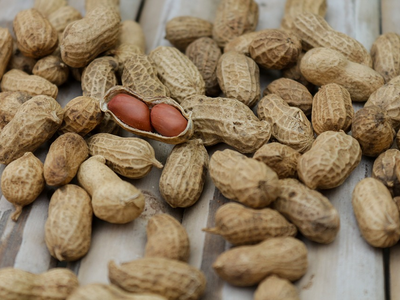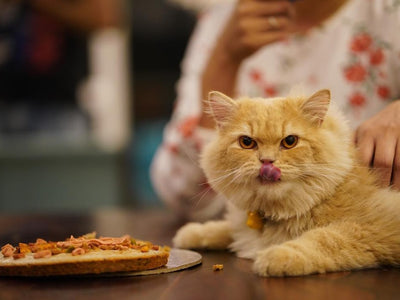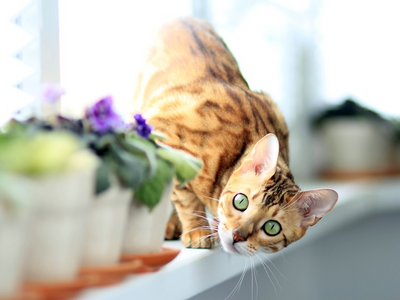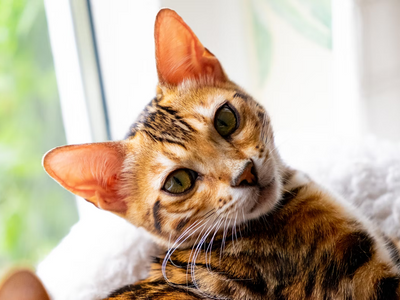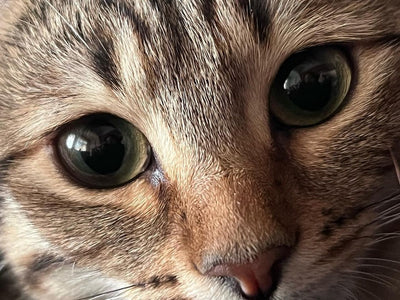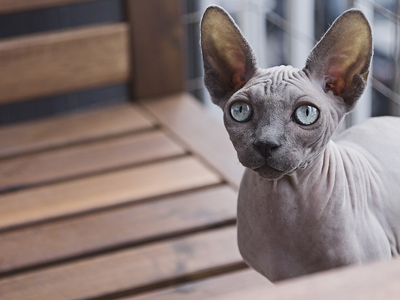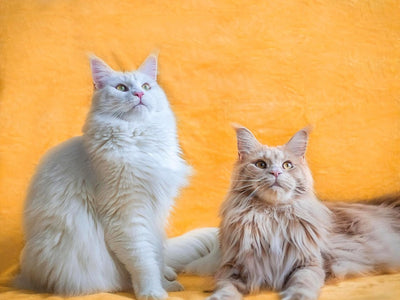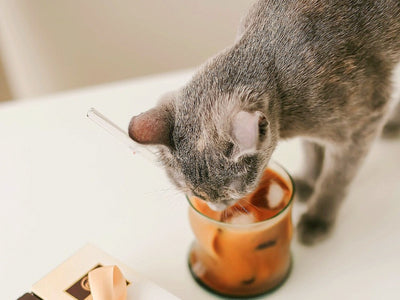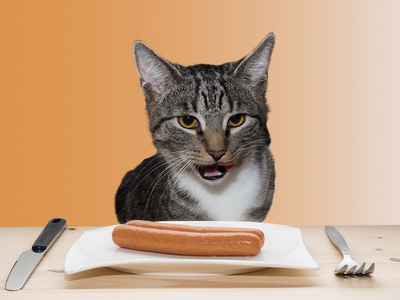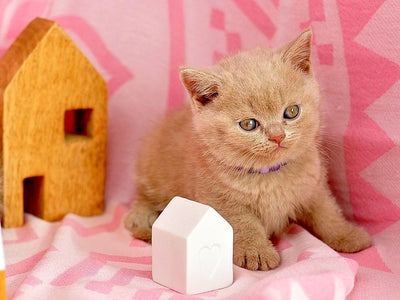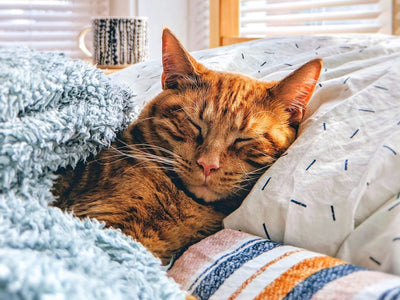18.01.2022
Should I give my cat vitamins? The pros and cons of feline dietary supplements
Ideally, your cat should get all their nutrients from a well-balanced, entirely carnivorous diet, but is that always possible? Even if you treat your feline companion to delicious tailor-made meals each day, they might develop nutritional deficiencies due to an underlying condition.
This article explains everything you should know about cat vitamins—when and how to give them, what the potential risks are, and how to tell if your cat needs them in the first place!
Are food supplements for cats necessary?
The four pillars of the feline natural diet are:
- Water—Cats need to be adequately hydrated to sustain their metabolism. Excessive water loss can lead to numerous health issues, from mild digestive problems like constipation to more concerning conditions, such as bladder stones, kidney failure, and skin disease
- Protein—Animal protein is the cat’s primary energy source. It’s also vital for their bone and muscle development. The nutrient contains amino acids, most notably taurine and arginine, that sustain the feline’s eye, heart, and brain function. Cats can’t synthesise taurine, and animal protein is the only viable source
- Animal fat—Healthy fats contain essential fatty acids, mainly omega-3 and omega-6, that help prevent skin disease and excessive shedding. The fatty acids also enable wound regeneration and can soothe inflammation
- Natural vitamins and minerals—Bioavailable micronutrients in meat, such as vitamin B complex, potassium, iron, zinc, magnesium, and selenium, ensure that the feline’s metabolism runs smoothly
If your feline friend were hunting in the wild, they’d get all the essential macro and micronutrients from their prey. Besides mice and insects, indoor cats don’t have access to freshly slaughtered prey and require a well-balanced diet to thrive.
Most cat food manufacturers design their products to meet the feline’s fluctuating nutritional needs. When formulating recipes, top-shelf brands also adjust the nutrient ratio according to:
- Life stage—Kittens and seniors can have different nutritional requirements from adult cats
- Breed—Some breeds are genetically predisposed to particular diseases (e.g., Siamese cats are more prone to diabetes mellitus) and may require a special diet. Their eating habits may also differ. For example, Maine Coons have a larger frame and tend to eat more than a British Shorthair would
- Weight—Obese and overweight cats need a low-sodium, low-carb diet, while an average-sized cat can handle more calories without jeopardising their health
- Sterilisation status—Cats usually experience an increase in appetite and decrease in energy levels post-sterilisation, which is why their feeding habits change
- Specific condition—Pregnant queens are sometimes given food supplements during pregnancy and nursing. Their energetic and nutritional needs also change drastically
If your pet’s meals contain the appropriate ratio of moisture, proteins, fats, and bioavailable vitamins and minerals—there’s no need for any food supplements. Giving your cat vitamin or mineral supplements without consulting your vet can mess with their metabolism and cause health problems. For example, too much phosphorus in the feline diet can result in urinary tract disease.

Everything your cat needs is already in meat.
Image (c) Untamed
When is it okay to give cat vitamins?
You should only consider giving your cat vitamins and minerals when your vet prescribes them as therapy. Several health-related circumstances can call for the use of food supplements, most commonly:
- Chronic health issues—If your cat suffers from a health condition that prevents them from absorbing a particular nutrient, they may need to compensate with a feline vitamin supplement. For example, cats with gastrointestinal diseases, such as irritable bowel syndrome (IBS), often have a vitamin B deficiency and are prescribed vitamin B12 or cobalamin
- A compromised immune response—Cats who’ve contracted the feline immunodeficiency virus (FIV) or suffer from a similar illness can be prescribed food supplements to boost their immune response
- Pregnancy—Pregnant cats are often given vitamin supplements during the full term and afterwards throughout the nursing period. Since they’re sustaining the entire litter, they sometimes develop nutritional deficiencies, especially if they get pregnant young (before ten to 12 months)
- Malnutrition recovery—Cats who have suffered an unhealthy weight loss often have vitamin deficiencies. As part of their recovery, they may require multivitamin supplements, most likely niacin and folic acid
Wait, how do I know my cat has a nutritional deficiency? If you take your pet to regular checkups, your vet will tell you whether there’s cause for concern. You can also keep an eye on the most common symptoms listed in the table below:
|
Micronutrient |
Sign of deficiency |
|
Vitamin A |
Eye disease (e.g., conjunctivitis), weight loss, weakness, and reproductive and developmental problems |
|
Vitamin K |
Increased haemorrhaging, blood not clotting |
|
Thiamin |
Slowed reflexes, irregular heart rate, and seizures (rare) |
|
Niacin |
Weight loss, inflamed (red) tongue, and fever |
|
Vitamin B12 |
Vomiting, diarrhoea, intestinal disease, and weight loss |
|
Vitamin D |
Appetite loss, weight loss, poor grooming, and rickets |
|
Calcium |
Thyroid dysfunction, curved spine and pelvic, and bone fractures |
|
Magnesium |
Convulsions, muscle twitching, and poor growth (kittens) |
|
Potassium |
Weight loss, muscle weakness, and neurological problems |
|
Zinc |
Skin lesions, dull fur, and testicular atrophy |
|
Iron |
Lethargy, diarrhoea, pale gums, and muscle weakness |
Different types of vitamin and mineral supplements for cats
Depending on your cat’s life stage, overall health, and specific condition, they may get different feline vitamin and mineral supplements:
- Minerals and vitamins—Micronutrients, such as vitamin B complex, zinc, magnesium, etc., are present in high-quality cat food, but if your cat has a specific deficiency, they can compensate with supplements. Cat vitamins are available in liquid or powdered form
- Probiotics—The healthy bacteria preserve your cat’s digestive health and regulate bowel movement. While there are natural probiotics available, such as yoghurt, it’s better to use vet-prescribed supplements
The so-called nutraceuticals, i.e., herbal or natural remedies sold in pet stores or pharmacies, are also pretty popular. You’ve probably run into the following examples:
|
Type of nutraceutical |
What it does |
|
Glucosamine |
Relieves pain caused by arthritis and increases joint mobility |
|
Chondroitin |
Often given along with glucosamine to sustain bone health |
|
Milk thistle |
Promotes liver function and helps detoxification |
|
Omega-3 fatty acid |
Regulates cholesterol levels, prevents heart disease, sustains liver function, and strengthens the immune response |
Nutraceuticals serve multiple purposes—from boosting the feline’s immune response and sustaining their metabolic functions to battling bacterial infections. The effects of the therapy can vary depending on the type of supplement and your cat’s specific condition.
Important side notes—Although you don’t need a prescription to buy nutraceuticals, you should still consult your vet before incorporating them into your cat’s diet. Popular home remedies, like coconut oil, turmeric, green tea, ginger, or garlic, may work for humans but can be harmful to felines.
What type of food has the essential cat vitamins and minerals?
Preparing homemade meals with the perfect moisture, protein, fat, vitamins, and minerals ratio is no small feat. The more practical (and ultimately healthier) solution is to rely on store-bought products.
Commercial cat food is thoroughly regulated and designed to meet the unique nutritional needs of your feline companion. High-quality wet food is probably the closest to what your cat would eat in the wild because it’s:
- Rich in animal protein
- Low in carbs
- Hydrating (78% moisture content)
Semi-moist and moist products also contain the recommended doses of vitamins and minerals, eliminating the need for dietary supplements.
Dry cat food is somewhat less nutritious because of the way it’s processed. Kibble is made by mixing meat, veggies, and grain into a blend, which is then exposed to extreme heat. The final product is highly caloric and lacks moisture (merely 10%).
Ultimately, a wet-food-only diet is favoured by most vets, although you can mix the two products if your pet is fussy and specific about their meals.
As for treats, the rule is that complementary food shouldn’t take up more than 3% of the overall meal plan. You can give your cat the occasional fruit or veggie snack to introduce fibre to their diet but make sure it’s feline-friendly! For example, strawberries, pumpkins, watermelons, bananas, and apples are okay, but grapes and citruses are off-limits. Also, don’t
give your cat people food, like chocolate or peanut butter, because it can be toxic or provoke allergic reactions.
The best snack for your pet is a protein-packed meat bite. That doesn’t include processed charcuterie staples, such as ham or bacon (at least not in large amounts), but rather:
- Chicken
- Turkey
- Liver
- Tuna
- Scallops
- Mussels
- Clams
- Carp
- Tilapia
- Salmon
- Cod
Looking for a nutrient-dense feline diet? Get Untamed and keep your cat happy and healthy!
Do you want to treat your cat to delicious meals packed with vitamins and minerals? Untamed is the feline superfood you were looking for! Our nourishing recipes will ensure your feline companion has a long and fulfilling life.
We’ve worked hard to come up with the ultimate feline diet. Each Untamed meal is:
- Full of protein—The protein content in a single serving of Untamed food is twice the industry standard. We don’t use plant protein, meat derivatives, or other useless or harmful substances—only the best animal protein for our feline delicacies
- Made with whole meat—We use premium meat cuts in our tasty and nourishing recipes. Each ingredient is of human-grade quality, and the final product is packed with bioavailable nutrients your cat needs to stay healthy
- Vet-formulated—Veterinarians designed our meals to meet your cat’s unique biological needs. Each serving is nutrient-dense and free of all known allergens
- Ethically produced—When we say we care about creating a better world for our feline friends, we mean it! Untamed packaging is recyclable. We get our ingredients from sustainable sources and leave a neutral carbon footprint
- Impossible to resist—Untamed meals are as tasty as they are nourishing. Watch your fussy eater twist their whiskers in anticipation when you open a tin of our gourmet cat food
We gently steam all our meals to make sure the original bioavailability of the ingredients is preserved during production. Because we don’t over-process our food, your cat will start feeling the Untamed effect soon after finishing their first dish! Here’s a breakdown of the short- and long-term health benefits our diet can provide:
|
Timeline |
Health benefits |
|
Within a week |
|
|
After two months |
|
|
Within four months |
|
|
Life-long benefits |
|
Check out our delicious recipes!
Untamed food is nutrient-dense and designed after the feline natural diet! Our dishes are made with premium meat cuts, such as:
- Chicken breast and liver
- Duck breast
- Tuna steak
- Salmon fillet
- Sardine and mackerel fillet
Our menu is filled with creative recipes, specifically formulated to provide nourishment and bring joy to our feline friends! The most popular products include:
- Chocka Chicken in Jelly—Extra moist chicken breasts soaked in jelly and light on the tummy
- Tuck-in Tuna in Jelly—Dolphin-safe tuna simmered in jelly and hearty fish broth
- Chocka Chicken with Duck in Jelly—The ultimate poultry platter, high-quality chicken breast mixed with whole duck meat, served in jelly
- Tuck-in Tuna with Salmon in Jelly—Delicious whole meat tuna soaked in jelly and served with high-grade salmon fillet
- Chocka Chicken in Gravy—A delicious dish for the sensitive feline, made with shredded chicken breast and steamed in natural gravy
Take the Untamed online quiz and design the perfect meal plan for your feline companion!

Untamed food was carefully designed to provide nourishment. Each recipe contains all the necessary micronutrients, providing long-term health benefits!
Image (c) Untamed
How do I become a member of the Untamed community?
If you become a member of the Untamed clowder, your pet can enjoy a healthy meal every day! Sign up for a tester pack and treat your cat to exciting feline delicacies every day. To buy our cat food online, all you have to do is:
- Visit our Try Now page
- Tell us about your cat
- Select a meal plan and place the order
We'll deliver your custom-made meal box within a day, with no additional shipping fees! Once your cat samples everything, you'll start receiving monthly deliveries of delicious Untamed food.
If you want to alter or cancel your order for any reason, modify your cat food subscription terms from your account as you please.

Smells nice in here! When’s dinner?
Image (c) Untamed
Do I need to give my foster kitten supplements?
If the mother is around, the kitten will primarily feed on breast milk for the first few weeks. Foster kittens are no different, except they’re given a milk replacer formula (KMR) instead.
When they’re about eight to ten weeks old, they’ll slowly move on to solids and therefore depend on you more. You need to make sure your baby cat gets enough protein, fat, and calcium in their diet to sustain their development.
The nutrient ratio should look something like this:
|
Nutrient |
Recommended amount |
|
Protein |
Over 50% |
|
Fat |
Up to 20% |
|
Calcium |
Less than 3% |
During the weaning period, it’s best to give your pet specially formulated kitten food. Products made for fully grown felines would be too hard on their developing stomachs. Adult cat food also may not contain the micronutrients your kitten needs to grow, such as calcium, magnesium, copper, iodine, and vitamin A.
When it comes to kitten vitamins and minerals, you shouldn’t include them without consulting your vet. The combination of baby food and KMR is nourishing enough unless your vet specifically instructs you to use kitten supplements.
If you continuously exceed the recommended vitamin allowance in your kitty’s diet, they might showcase the following health concerns:
- Stunted growth
- Weight loss
- Vomiting
- Lethargy
- Tissue calcification
- Skeletal lesions
Nutritional deficiency is the other end of the spectrum and can occur if you feed them low-quality food or start weaning them too soon. The kitten replacer formula is the only viable substitute for breast milk and should be part of your kitty’s diet until your vet says otherwise.
Giving them cow milk or other variants will merely upset their stomach instead of providing nourishment. Cats are lactose intolerant by design and can’t digest milk from another species.
Should I give my senior cat vitamin supplements?

As your cat approaches the golden age, they’ll need a bit of extra care!
Source: Tucker Good
Your feline’s nutritional and energetic needs change with age. Oldtimers lose their youthful drive along the way and will require less caloric, nutrient-dense meals. The most common ailments your cat will experience as they approach the golden age include:
- Dental disease (especially teeth loss)
- Trouble with weight control
- Lack of energy
- Appetite loss
- Skin and coat deterioration
- Urinary tract disease
- Digestive tract issues
- Respiratory problems
- Diabetes
- Impaired kidney function
If your senior cat is in good shape and enjoys a well-balanced diet, there’s a good chance they won’t need mineral or vitamin supplements.
Of course, it’s not uncommon for older felines to develop nutritional deficiencies. They can have difficulty absorbing particular nutrients due to their deteriorating health, which is why regular check-ups are crucial.
Your vet may also recommend food supplements if your cat appears to be losing their mental sharpness. Antioxidants like vitamins E and C have a positive effect on brain cells and have been known to help with cognitive dysfunction.
If you notice your senior cat is slowing down, look for food with high quantities of antioxidants to sustain their ageing brain. For example, fish contains numerous natural compounds that can repair brain cells and prevent disease, such as cancer.

![Associated image for What human food can Sphynx cats eat? [Comprehensive list]](http://untamed.com/cdn/shop/articles/what_human_food_can_sphynx_cats_eat_Featured_400x300_crop_center.jpg?v=1648705074)
